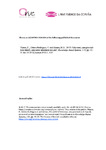Mostrar o rexistro simple do ítem
Universal, unsupervised (rule-based), uncovered sentiment analysis
| dc.contributor.author | Vilares, David | |
| dc.contributor.author | Gómez-Rodríguez, Carlos | |
| dc.contributor.author | Alonso, Miguel A. | |
| dc.date.accessioned | 2024-01-17T17:04:38Z | |
| dc.date.available | 2024-01-17T17:04:38Z | |
| dc.date.issued | 2017-02 | |
| dc.identifier.citation | Vilares, D., Gómez-Rodríguez, C. and Alonso, M.A. (2017) ‘Universal, unsupervised (rule-based), uncovered sentiment analysis’, Knowledge-Based Systems, 118, pp. 45–55. doi:10.1016/j.knosys.2016.11.014. | es_ES |
| dc.identifier.issn | 0950-7051 | |
| dc.identifier.issn | 1872-7409 | |
| dc.identifier.uri | http://hdl.handle.net/2183/34960 | |
| dc.description | © 2017. This manuscript version is made available under the CC-BY-NC-ND 4.0 license https://creativecommons.org/licenses/by-nc-nd/4.0/. This version of the article: Vilares, D., Gómez-Rodríguez, C. and Alonso, M.A. (2017) ‘Universal, unsupervised (rule-based), uncovered sentiment analysis’ has been accepted for publication in Knowledge-Based Systems, 118, pp. 45–55. The Version of Record is available online at https://doi.org/10.1016/j.knosys.2016.11.014. | es_ES |
| dc.description.abstract | [Abstract]: We present a novel unsupervised approach for multilingual sentiment analysis driven by compositional syntax-based rules. On the one hand, we exploit some of the main advantages of unsupervised algorithms: (1) the interpretability of their output, in contrast with most supervised models, which behave as a black box and (2) their robustness across different corpora and domains. On the other hand, by introducing the concept of compositional operations and exploiting syntactic information in the form of universal dependencies, we tackle one of their main drawbacks: their rigidity on data that are structured differently depending on the language concerned. Experiments show an improvement both over existing unsupervised methods, and over state-of-the-art supervised models when evaluating outside their corpus of origin. Experiments also show how the same compositional operations can be shared across languages. The system is available at http://www.grupolys.org/software/UUUSA/ | es_ES |
| dc.description.sponsorship | This research is supported by the Ministerio de Economía y Competitividad (FFI2014-51978-C2). David Vilares is funded by the Ministerio de Educación, Cultura y Deporte (FPU13/01180). Carlos Gómez-Rodríguez is funded by an Oportunius program grant (Xunta de Galicia). We thank Roman Klinger for his help in obtaining the German data. | es_ES |
| dc.language.iso | eng | es_ES |
| dc.publisher | Elsevier | es_ES |
| dc.relation | info:eu-repo/grantAgreement/MECD/Plan Estatal de Investigación Científica y Técnica y de Innovación 2013-2016/FPU13%2F01180/ES/ | es_ES |
| dc.relation | info:eu-repo/grantAgreement/MINECO/Plan Estatal de Investigación Científica y Técnica y de Innovación 2013-2016/FFI2014-51978-C2-1-R/ES/TECNOLOGIAS DE LA LENGUA PARA ANALISIS DE OPINIONES EN REDES SOCIALES | es_ES |
| dc.relation.isreferencedby | 10.1016/j.knosys.2016.11.014 | |
| dc.relation.uri | https://doi.org/10.1016/j.knosys.2016.11.014 | es_ES |
| dc.rights | Atribución-NoComercial-SinDerivadas 4.0 Internacional | es_ES |
| dc.rights.uri | http://creativecommons.org/licenses/by-nc-nd/3.0/es/ | * |
| dc.subject | Sentiment analysis | es_ES |
| dc.subject | Multilingual | es_ES |
| dc.subject | Dependency parsing | es_ES |
| dc.subject | Natural language processing | es_ES |
| dc.title | Universal, unsupervised (rule-based), uncovered sentiment analysis | es_ES |
| dc.type | info:eu-repo/semantics/article | es_ES |
| dc.rights.access | info:eu-repo/semantics/openAccess | es_ES |
| UDC.journalTitle | Knowledge-Based Systems | es_ES |
| UDC.volume | 118 | es_ES |
| UDC.issue | 15 | es_ES |
| UDC.startPage | 45 | es_ES |
| UDC.endPage | 55 | es_ES |
| dc.identifier.doi | 10.1016/j.knosys.2016.11.014 |
Ficheiros no ítem
Este ítem aparece na(s) seguinte(s) colección(s)
-
GI-LYS - Artigos [51]






